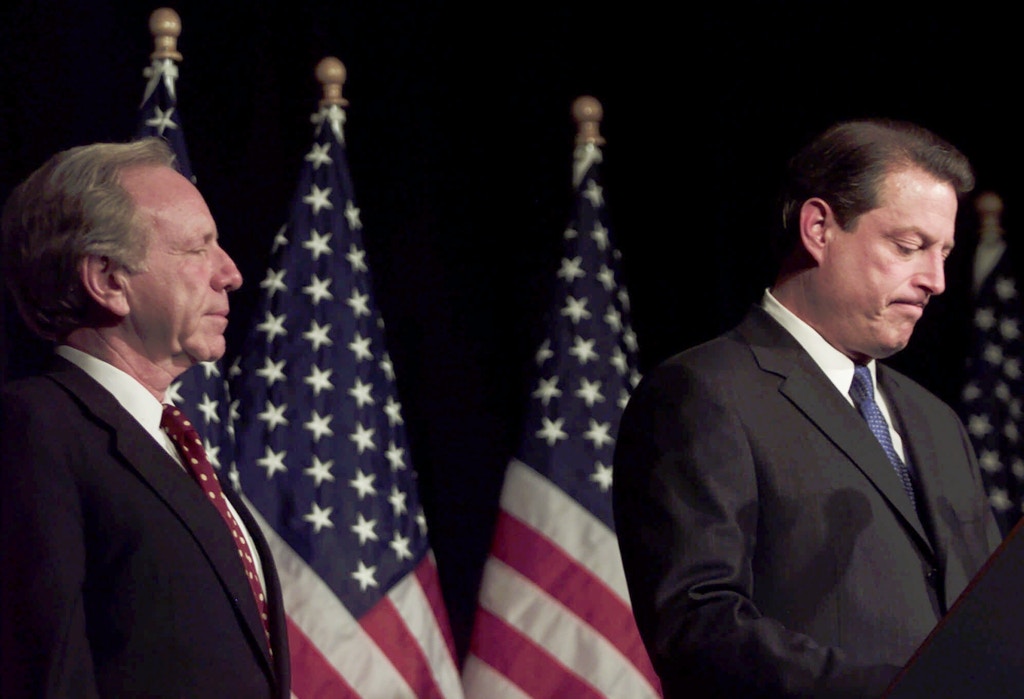
Hundreds of demonstrators take part in a rally on the steps of the old Florida Capitol to protest the U.S. Supreme Court decision to not allow a recount of the Florida undervotes on Dec. 13, 2000 in Tallahassee, Fla. Photo: Robert King/Newsmakers/Getty Images
At midnight on election day last Tuesday, vote tallies showed Republican candidates ahead in key races in Florida, Georgia and Arizona. However, many votes remained to be counted in all three states. The stakes are high: two Senate seats (Florida and Arizona) and two governorships (Florida and Georgia), plus some lower offices. And as the count has proceeded, the Democratic candidate in each case has gained more votes than the Republican, narrowing the margin or – in the case of the Senate election in Arizona – taking the lead.
Republicans, led by President Trump, have responded by declaring that counting these votes is somehow fraudulent. The GOP’s rhetoric has been particularly preposterous in Florida, where Governor Rick Scott is attempting to switch offices by ousting incumbent Democratic Senator Bill Nelson. Scott’s Tuesday night margin of 50,000 votes is now down to 15,000, and he’s demanded that the Florida Department of Law Enforcement investigate some unspecified malfeasance. Each race now appears likely close enough to trigger a recount (or in the case of the Georgia governor’s race, a run-off.)
All this has led many to compare the current situation to the nightmarish legal battle over the Florida recount in the 2000 presidential race between Al Gore and George W. Bush.
But two critical facts from that debacle have been erased from history, and are not being mentioned anywhere today:
First, we know that Al Gore won Florida in 2000. If a full, fair statewide recount had taken place, he would have become president.
Second, Gore lost largely because, unlike Bush, he refused to fight with all the tools available to him.
Jane McAlevey, a longtime union organizer and author, witnessed the disaster up close as part of the AFL-CIO’s team on the ground in West Palm Beach. In the prologue to her 2012 book, Raising Expectations (excerpted with permission below), she describes what she saw in enraging detail, concluding that “the absolute determination with which the labor elite and the Democratic Party leadership crushed their own constituents’ desire to express their political passions cost us the election.” Today she is deeply concerned that Democrats have forgotten — or never even knew — what happened 18 years ago. “It’s another national, defining crisis,” McAlevey said Friday. “We need to win it this time. If Democrats have not learned the lessons from 2000, [the GOP] will manipulate the process again and take away the rightful decision of the voters, in Florida, Arizona and Georgia.”
The 2000 election took place on November 7. By that night it was clear that Gore had won the national popular vote, but that whoever took Florida would win the electoral college and the presidency. The Florida vote was so close that the networks alternately declared both Gore and Bush the winner, and Gore called Bush to concede and then called him back to retract his concession.
The Florida Division of Elections announced the next day that Bush had won the state by 1,784 votes. However, this margin was so small that Florida law required a machine recount of the state, which reduced Bush’s lead to 327.
The presidential choice on about 170,000 ballots could not be read by machine. Of these, 60,000 were “undervotes” – for instance, the voter had not fully punched through the ballot’s relevant perforated box. The remaining 110,000 were “overvotes,” in which the voter may have voted normally for Bush or Gore but also wrote in their name.
The Gore campaign requested a recount by hand in four heavily Democratic counties. The Bush campaign sued to stop this. The Gore campaign’s efforts then disappeared for the next month into a mind-numbingly complex legal process, overflowing with ballot-design and deadline minutiae that no normal Americans could follow.
Meanwhile, the Republican Party conducted a nationwide PR campaign with a message Americans could follow: that Gore was a pathetic sore loser who simply would not accept that he’d been defeated. Much of the national media eagerly adopted this frame.
On December 8, the Florida Supreme Court rejected Gore’s request for a hand recount in four counties. Instead, it ordered a statewide hand recount of undervotes, with the decisions being made according to the “intent of the voter.”
The U.S. Supreme Court then halted this recount on December 12, declaring that, since different Florida counties used different voting methods, the voter intent standard violated the Equal Protection Clause of the Constitution.
Gore could theoretically have asked the Florida Supreme Court to order a statewide recount with more explicit standards. But he took the advice of one of his lawyers, who told Gore this would “cause a tremendous uproar.” And in any case, as the book Deadlock later put it, “the best Gore could hope for was a slate of disputed electors” – i.e., he might become president, but Republicans would complain about it.
Thus Gore conceded to Bush again, in a speech full of high-minded rhetoric about “the law” and how his surrender could “point us all to a new common ground.”Bush officially won Florida by 537 votes and the electoral college by 271-266, and went on to become one of the most catastrophic presidents in U.S. history.
A year later, in November 2001, the National Opinion Research Center at the University of Chicago announced the results of an examination of all 170,000 undervotes and overvotes.
NORC found that with a full statewide hand recount, Gore would have won Florida under every possible vote standard. Depending on which standard was used, his margin of victory would have varied from 60 to 171 votes.
The recount was paid for by a consortium of news outlets — CNN, the New York Times, the Wall Street Journal, the Tribune Company, the Washington Post, the Associated Press, the St. Petersburg Times, and the Palm Beach Post. But this was just two months after the September 11 terrorist attacks. The outlets patriotically buried the blockbuster news that George W. Bush was not the legitimate president of the United States.
For instance, the headline of the New York Times article on the recount was “Study of Disputed Florida Ballots Finds Justices Did Not Cast the Deciding Vote.” This was technically true — since Gore’s legal team had not demanded a full recount of the state — and it was shamelessly misleading. But even Gore himself had no interest in making an issue about what had really happened. Asked for comment by the Washington Post, Gore would say only that “the presidential election of 2000 is over.”
In McAlevey's book, she recounts that in her first days in West Palm Beach she worked on collecting affidavits from Floridians, mostly retirees, who believed their votes had not been correctly tallied. There were huge numbers of them, and they were furious. McAlevey asked her superiors, “So when can we actually mobilize them, put these wonderful angry senior citizens into the streets and on camera?”
The answer came back: never. She then learned that Jesse Jackson was coming to Florida to lead a rally, but organized labor would not be participating. Why? Because the Gore campaign wanted everyone to stand down. McAlevey quotes a higher up as telling her, “The Gore campaign has made the decision that this is not the image they want. They don’t want to protest. They don’t want to rock the boat. They don’t want to seem like they don’t have faith in the legal system.”
This was Gore’s central mistake. “You cannot trust ‘the legal process,’” McAlevey explains today. In reality, there is no such thing as a fair legal process separate from and immune to outside political pressure.
The Republicans understood this in 2000, but Democrats did not. Instead, terrified of being portrayed as acting as a mob, the Democrats ceded people power to the GOP — who actually were a mob. “The original use of a mob in recent history was the Brooks Brothers riot,” says McAlevey, who was present when paid Republican staffers famously halted a recount in Miami-Dade. “They were literally throwing chairs and tables.”
Already the GOP is gearing up for the same kind of direct, physical intimidation of vote counts in support of their legal strategy. Staffers at the Broward County election headquarters have requested police protection from Republican activists who’ve shown up at their offices addled by Trumpian conspiracy theories about vote fraud.
To stop a rerun of 2000, says McAlevey, “Every house of faith, every synagogue, every church, needs to be out in the streets with serious, non-violent action, on a message of ‘don’t let them steal your vote’ … that we must have the right and freedom to vote.” A clear message from organized people in the streets will create political support for a legal strategy to get every vote counted.
Even some of the Republicans involved in their 2000 victory have recognized how damaging it was. Sandra Day O’Connor, part of the 5-4 Supreme Court majority that awarded Bush the presidency, said in 2013 that it might have been better if they’d never agreed to hear the case. Matthew Dowd, once a top Bush campaign staffer, tweeted Friday that “Not counting all the votes in Florida in 2000 was a grave injustice and caused many to question the legitimacy of Bush election. Let us not repeat that injustice in FL and AZ this year. Count all the votes.”
Whether Democrats will have the creativity and mindset needed to make this happen remains to be seen. But one thing’s for sure, says McAlevey: Anyone who at this late date believes in a strategy of trusting the system to deliver the most basic justice “needs to have their head examined.”
Originally published on The Intercept














